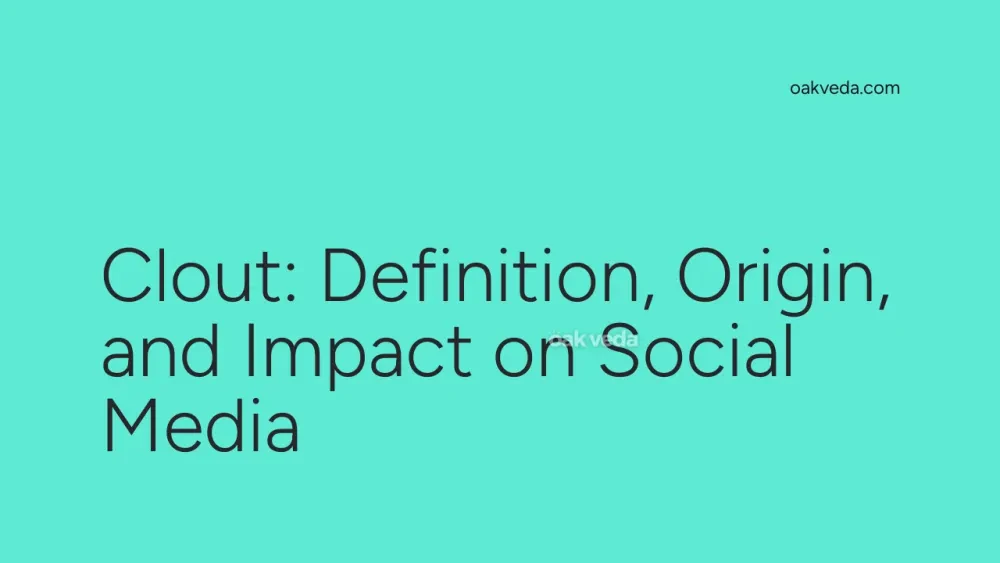
What is Clout?
In the realm of social media, "clout" refers to an individual's influence, reputation, or popularity within online spaces. It's a measure of one's ability to impact opinions, trends, and conversations across digital platforms. Having clout means possessing a significant following, generating high engagement, and wielding substantial influence within specific communities or niches.
Origin and Development of Clout
The term "clout" has an interesting evolution. Originally derived from Old English, it meant a piece of cloth or clothing. Over time, it came to signify influence or power, often in political contexts. In recent years, clout has been repurposed by internet culture, particularly on social media platforms, to describe digital influence and online status.
How Clout Works
Clout in social media is typically measured by:
- Number of followers or subscribers
- Engagement rates (likes, comments, shares)
- Reach and impressions of content
- Ability to drive trends or conversations
- Collaborations with brands or other influencers
Individuals with high clout can often shape opinions, influence purchasing decisions, and even impact social or political discourse within their sphere of influence.
Types of Clout
While clout is a general term, it can manifest in different forms across various platforms:
- Instagram Clout: Often associated with lifestyle, fashion, and visual content
- Twitter Clout: Linked to witty remarks, thought leadership, and real-time commentary
- YouTube Clout: Based on video content creation and subscriber count
- TikTok Clout: Centered around viral short-form video content and trends
Popular Examples of Clout
Several individuals have become synonymous with social media clout:
- Kylie Jenner: With millions of followers across platforms, her posts can significantly impact brand visibility and sales.
- MrBeast: Known for his elaborate YouTube videos and philanthropic efforts, he has immense influence in the content creator space.
- Charli D'Amelio: Rose to fame on TikTok, becoming one of the platform's most-followed creators and influencing dance trends.
Impact of Clout on Social Media Culture
Clout has profoundly shaped social media culture in several ways:
- Content Creation: Users are motivated to create more engaging and shareable content to increase their clout.
- Influencer Economy: The rise of influencer marketing is directly tied to the concept of clout.
- Social Currency: Clout has become a form of social currency, affecting personal and professional opportunities.
- Platform Features: Social media platforms have introduced features like verified badges and creator funds to recognize and monetize clout.
Controversies Surrounding Clout
The pursuit of clout is not without controversy:
- Clout Chasing: Some individuals engage in attention-seeking or controversial behavior solely to gain clout, often at the expense of authenticity.
- Mental Health Concerns: The pressure to maintain or increase one's clout can lead to stress, anxiety, and burnout.
- Misinformation: High-clout individuals spreading false information can have far-reaching consequences.
- Authenticity vs. Popularity: Critics argue that the focus on clout can overshadow genuine talent or valuable content.
How Brands and Influencers Use Clout
Brands and influencers leverage clout in various ways:
- Influencer Partnerships: Brands collaborate with high-clout individuals to reach target audiences.
- Product Launches: Influencers use their clout to generate buzz around new products or services.
- Social Causes: Those with significant clout can raise awareness for important social issues.
- Monetization: Influencers convert their clout into income through sponsored content, merchandise, and exclusive offerings.
Future Trends Related to Clout
As social media continues to evolve, so does the concept of clout:
- Niche Clout: Increasing value placed on influence within specific, targeted communities rather than just overall follower count.
- AI and Clout: The use of artificial intelligence to identify and measure authentic influence more accurately.
- Decentralized Platforms: The rise of blockchain-based social media may introduce new ways of quantifying and rewarding clout.
- Ethical Influence: Growing emphasis on responsible use of clout, with audiences valuing authenticity and positive impact.
FAQs about Clout
-
Is clout the same as fame? While related, clout specifically refers to online influence, whereas fame can exist both online and offline.
-
Can you buy clout? While it's possible to purchase followers or engagement, authentic clout is built through genuine connection and valuable content.
-
How do you gain clout on social media? Consistently create high-quality, engaging content, interact with your audience, and stay active in your niche community.
-
Is clout important for businesses? Yes, having clout can significantly boost a business's online presence, customer trust, and marketing effectiveness.
-
Can you lose clout? Absolutely. Clout can diminish due to inactivity, controversies, or changes in platform algorithms.
In conclusion, clout has become a central concept in the social media landscape, shaping how we create, consume, and value online content. As the digital world continues to evolve, the nature of clout may change, but its importance in online interactions is likely to persist, making it a crucial element for anyone looking to make an impact in the digital sphere.
You may be interested in:
- Media Kit: Definition, Origin, and Impact on Social Media
- Salty: Definition, Origin, and Impact in Social Media
- Milkshake App: Definition, Origin, and Impact on Social Media
- FYP (For You Page): Definition, Origin, and Impact
- Millennials: Definition, Origin, and Impact on Social Media
- Thread: Definition, Origin, and Impact on Social Media

